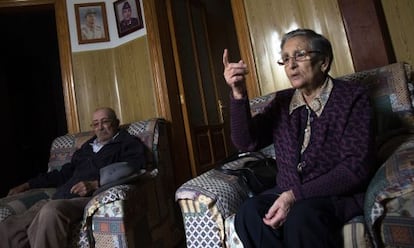“The Church has sold us out”
Elderly residents face eviction after Canary Islands diocese does land deal with local businessman

In 1959, Marcial Sinforiano and his wife Pilar, their six children and her father, moved from the one-room house they lived in to one of six properties in Argana Alta, near Arrecife, the capital of the Canary Island of Lanzarote. The buildings had been funded by the Catholic Church, and constructed by volunteers. Now, more than half a century later, and in their nineties, the couple have been told by their local diocese that they must leave their home by May 23.
The contract they signed with the Catholic Church authorities on the island said the couple could live rent free in the property until such time as there was “not the serious need that has produced this transfer, or if there is a person or family with greater need and urgency for accommodation.”
Over the course of the next five decades, they remained in the house, and in the 1970s, the property was fitted with running water and electricity. The couple had three more children, and they extended the house, adding a kitchen, bathroom, two more bedrooms, and eventually a first floor. “I have put more into this place than it was ever worth,” insists Pilar.
But in 2006, Antonio Perera took over as parish priest in Argana Alta. “He asked us if we would mind holding a meeting in our house with the other neighbors,” says Pilar.
None of the elderly people living in the six properties say they have received any offer of rehousing
“I told them that the properties were going to be sold and that they had three options,” Perera says via a telephone interview. “They could return the property, which was the logical thing to do; they could buy it, or they could move to another, rented property.” He says that the conversation with the elderly occupants of the Church properties was “not very pleasant,” and that any sale was dependent on the buyer offering a home to the current occupants. The properties have been sold for 360,607 euros, which Perera says was needed urgently by the local parish: “We thought long and hard about this decision.”
In fact, the diocese has been selling parts of the land on which the houses are situated for the last decade. In 2006 it sold the properties to a company run by Juan Antonio Rivera-Iveco, a local car dealer, but the year before that it had divided the land up and had it valued. In 2001 it had sold 4,000 square meters of the plot.
Juan Antonio Rivera has refused to talk to EL PAÍS about the purchase. None of the elderly people living in the six properties say they have received any offer of rehousing, and do not want to leave their homes. “The Church has sold us out,” says Pilar.
Rivera has since sent letters to the residents of the properties he now owns telling them they have to vacate their homes. He has now put the matter in the hands of the courts. Two of the six properties have already been demolished.
“What’s clear in this matter is that the Church decided to go ahead with the sale without consulting these people”
The remaining residents have appealed to the courts, and the matter is being decided by the Canary Islands regional High Court. Another resident, Luis Manuel Torres, aged 56 and unemployed, has been given until April 11 to vacate his home, which was passed on to him by his parents.
Pilar and Marcial have put their hopes in Andrés Medina, the former head of the neighborhood residents’ association, who has written to Pope Francis about the way the local diocese has handled the matter. The couple have been assigned five duty lawyers by the courts, three of whom passed the case on after a couple of days. The Mortgage Victims Platform, set up to prevent homeowners unable to keep up with mortgage repayments from being evicted in the wake of the banking collapse, has taken up their case. It has staged noisy protests that have attracted media attention and prevented some evictions from going ahead.
“What’s clear in all this is that the Church decided to go ahead with the sale without consulting these people,” says Medina, pointing out that Rivera faces legal charges over the running of his business.
Marcial, a man of few words, receives a state pension of €800, which is barely enough to cover the couple’s living costs and medicines. “How am I supposed to pay rent?” he asks.
Tu suscripción se está usando en otro dispositivo
¿Quieres añadir otro usuario a tu suscripción?
Si continúas leyendo en este dispositivo, no se podrá leer en el otro.
FlechaTu suscripción se está usando en otro dispositivo y solo puedes acceder a EL PAÍS desde un dispositivo a la vez.
Si quieres compartir tu cuenta, cambia tu suscripción a la modalidad Premium, así podrás añadir otro usuario. Cada uno accederá con su propia cuenta de email, lo que os permitirá personalizar vuestra experiencia en EL PAÍS.
¿Tienes una suscripción de empresa? Accede aquí para contratar más cuentas.
En el caso de no saber quién está usando tu cuenta, te recomendamos cambiar tu contraseña aquí.
Si decides continuar compartiendo tu cuenta, este mensaje se mostrará en tu dispositivo y en el de la otra persona que está usando tu cuenta de forma indefinida, afectando a tu experiencia de lectura. Puedes consultar aquí los términos y condiciones de la suscripción digital.








































